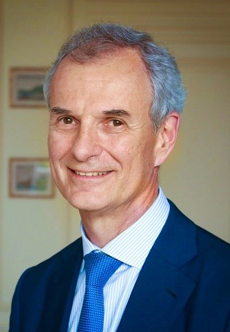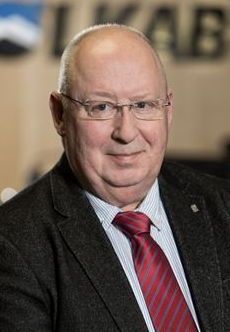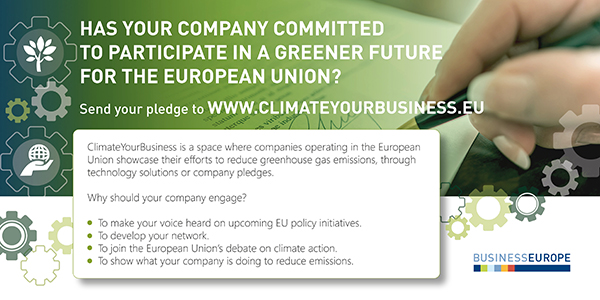Climate Technologies Day at COP25 - Side event on “Industrial decarbonisation: Key examples from EU business”
Thursday 12 December 2019 (12:30-14:00)
Venue: EU side events pavilion, room Brussels – COP25 (IFEMA), Madrid, Spain

European businesses across the board stand behind the EU ambition of net-zero greenhouse gas emissions (climate neutrality) to reach the objectives of the Paris Agreement. This event showcases how companies from around Europe are developing cutting-edge technologies and processes for deep GHG emission reductions in heavy industry, mining and refining.
Tentative programme
|
12:30 – 12:40 |
Welcome by the moderator
|
|
12:40 – 13:40 |
Company technology presentations
|
|
13:40 – 14:00 |
Q&A with the audience |
Speakers testimonials:
 Olivier Imbault, Senior Vice President, Air Liquide
Olivier Imbault, Senior Vice President, Air Liquide
“Air Liquide, as founding member of the Hydrogen Council and based on its 20 years extensive know-how on hydrogen, is committed to develop and scale-up sustainable hydrogen technologies to contribute to the energy transition. It is investing in the production of carbon-free hydrogen by electrolysis, where the PEM technology (Proton Exchange Membrane) will be key for decentralized production, storage at refuelling stations, and grid services. Air Liquide started to invest in the largest PEM electrolyser in the world (Canada) with a capacity of 20 MW. Furthermore, Air Liquide has already installed 100 hydrogen recharging stations in the world in which 40 are directly invested and operated by Air Liquide. To increase the logistic efficiency, liquid hydrogen technology is seen as a key enabler for maritime transport, long haul road transport and airplanes where large amounts of energy onboard are required. In this field, Air liquide is investing in liquid hydrogen production technology and is participating in LH2 projects supported by the European Commission (HEAVEN and PRESLHY projects).
 Volkmar Pflug, Chief Energy Economist, Siemens
Volkmar Pflug, Chief Energy Economist, Siemens
“Sector coupling – which is about bringing renewable energy from the power sector to other sectors like heating or transport – could reduce primary fossil energy consumption by half compared to a business-as-usual scenario, and by this greatly reduce carbon emissions. An important tool to do so is through Power-to-X, with the X standing for hydrogen or e-fuels. Hydrogen is of universal use, whether for transportation, heating or as a fuel for gas turbines, making them a sustainable technology even in a vastly decarbonized world. Furthermore, with 50% of the energy consumed in transport sector coming from heavy trucks and long-haul, marine and aviation, this is where e-fuels or synthetic fuels could play a big role, as they can utilize existing infrastructure. Siemens is committed to develop such solutions to decarbonize energy across sectors”
Bo Krogvig, Senior Vice President, LKAB
 “LKAB is the EU’s largest iron ore producer and mines around 80% of all iron ore within the EU. Sweden recently passed legislation that legally binds the country to reach net-zero emissions by the year 2045 and LKAB is working towards this same objective. During our intervention, LKAB will outline its path towards decarbonisation. For starters, LKAB’s iron ore pellets enable the production of iron with 14% less direct CO2 emissions than EU mean value emissions. Besides its main pelletisation activities, LKAB engages in strategic partnerships for increased competitiveness and sustainable development, such as HYBRIT, a breakthrough project that aims to make fossil free steel by 2030, Sustainable Underground Mining (SUM), which aims to create a new world standard for digitalised, CO2-free and autonomous mining for greater depths, and ReeMAP, an innovative technology for upgrading side streams to bi-products from the iron ore production”
“LKAB is the EU’s largest iron ore producer and mines around 80% of all iron ore within the EU. Sweden recently passed legislation that legally binds the country to reach net-zero emissions by the year 2045 and LKAB is working towards this same objective. During our intervention, LKAB will outline its path towards decarbonisation. For starters, LKAB’s iron ore pellets enable the production of iron with 14% less direct CO2 emissions than EU mean value emissions. Besides its main pelletisation activities, LKAB engages in strategic partnerships for increased competitiveness and sustainable development, such as HYBRIT, a breakthrough project that aims to make fossil free steel by 2030, Sustainable Underground Mining (SUM), which aims to create a new world standard for digitalised, CO2-free and autonomous mining for greater depths, and ReeMAP, an innovative technology for upgrading side streams to bi-products from the iron ore production”
Brigitta Huckestein, Senior Manager Energy & Climate Policy, BASF
 “In order to enable further GHG savings in the chemical industry in the long term, completely new technologies are needed. At BASF, we focus on the base chemicals: These are responsible for 70% of the GHG emissions of the chemical industry but are an indispensable starting point for the value chain. BASF’s key R&D projects focus on making these base chemicals almost GHG emission free. They include the production of emission-free hydrogen, the world's first electric heating concept for steam crackers, and a CO2-free synthesis pathway for olefins – which is the largest intermediate in the chemical industry in terms of volume. The first pilot plants are to be built in the coming years. The question of the competitiveness of such new technologies is closely linked to the availability of renewable electricity at competitive costs and the political framework. In order to enable successful implementation in the future, it is important to set the course now.”
“In order to enable further GHG savings in the chemical industry in the long term, completely new technologies are needed. At BASF, we focus on the base chemicals: These are responsible for 70% of the GHG emissions of the chemical industry but are an indispensable starting point for the value chain. BASF’s key R&D projects focus on making these base chemicals almost GHG emission free. They include the production of emission-free hydrogen, the world's first electric heating concept for steam crackers, and a CO2-free synthesis pathway for olefins – which is the largest intermediate in the chemical industry in terms of volume. The first pilot plants are to be built in the coming years. The question of the competitiveness of such new technologies is closely linked to the availability of renewable electricity at competitive costs and the political framework. In order to enable successful implementation in the future, it is important to set the course now.”
Organised by
 |
Please note that we may take pictures and/or make video and audio recordings at this event, in which you may be featured. By attending the event, you give the organisers the right to use such material for non-commercial purposes, including the posting of photos and/or videos on our website(s).
You can read our privacy policy for further information or contact us at privacy@businesseurope.eu.
